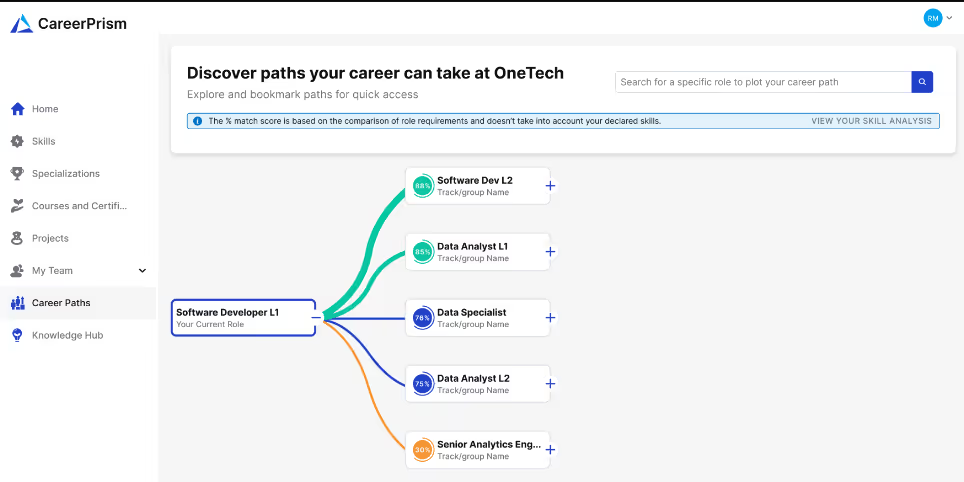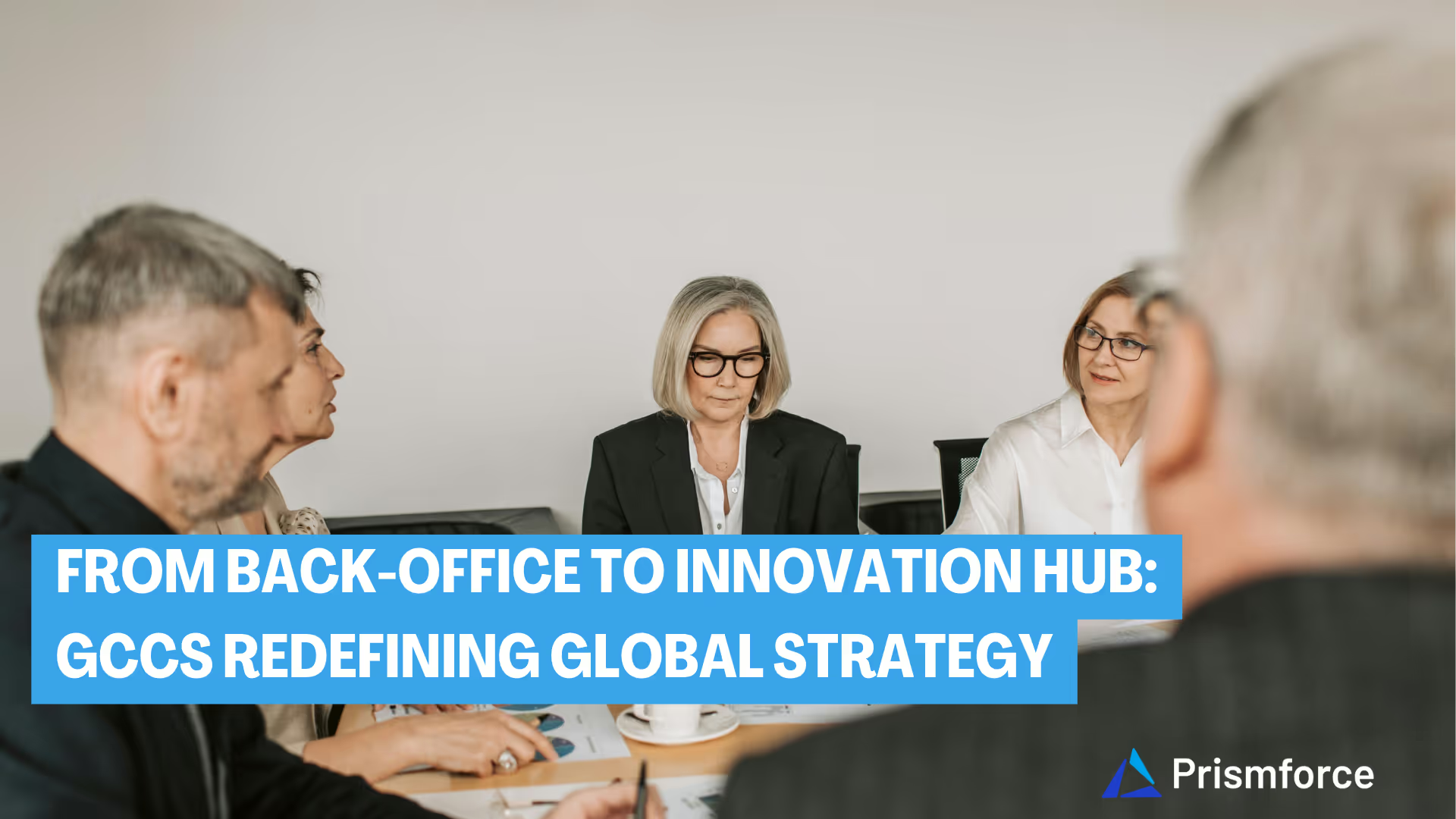.avif)
The future of work is being redefined by technology, and small and medium-sized enterprises (SMEs) can't afford to ignore the possibilities offered by artificial intelligence (AI). As SMEs strive to compete with larger enterprises, they face unique challenges in resource allocation and skill development. However, AI has the potential to level the playing field.
To explore how SMEs can leverage AI in skills management for strategic advantage, NASSCOM SME Connect recently hosted a webinar. Industry experts, including Prismforce's Founder and CEO, Somnath Chatterjee, and Product Strategy and Solutioning Lead, Chinmay Misra, discussed with Ramesh Krish, President of HR at Indium Software, how AI can transform learning and workforce planning for SMEs.
Here’s a quick recap of the key takeaways from the webinar:
Skills are the Core of the IT Industry
In the webinar, Somnath Chatterjee emphasized that skills are the backbone of the IT industry. He explained that IT companies are essentially in the business of selling, staffing, and delivering projects, all of which revolve around specific skills. This makes skills management a critical function.
He highlighted that the industry is rapidly evolving, with the number of required skills increasing fivefold over the last decade. Maintaining an up-to-date skill framework is vital. Companies need to continuously assess and update their skill inventory to stay competitive. This involves identifying current skill levels, anticipating future skill needs, and providing targeted learning and development opportunities for employees.
By leveraging AI, companies can better manage this complexity. AI can help identify skill gaps, suggest relevant training, and even predict future skill demands. This ensures that both employees and the company are always prepared for the next challenge.
AI Can Solve Practical Challenges in Skills Management
Chinmay Mishra elaborated on the practical challenges companies face in skills management. He identified three key issues: accessing talent, retaining talent, and nurturing talent.
Accessing Talent: SMEs often struggle to find the right talent. With the rapid pace of technological change, the demand for specific skills can quickly outstrip supply. AI can help by scanning large databases to assess and update their skill inventory to stay competitive continuously and identify potential candidates who match the required skills.
Retaining Talent: Simply hiring skilled employees is not enough. Companies must also focus on retaining them. AI can play a crucial role here by providing personalized career development plans and learning opportunities. This helps keep employees engaged and aligned with the company’s goals.
Nurturing Talent: Developing existing employees is essential for long-term success. AI can assist by identifying skill gaps and recommending relevant training programs. By continuously updating employees’ skill sets, companies can ensure they remain competitive in a fast-changing market.
Strategic Workforce Planning is Crucial
Strategic workforce planning is crucial in today's business landscape. During the webinar, several key themes emerged on how AI can play a pivotal role in this area:
Alignment with Business Goals: Companies need to ensure that their workforce skills align with their strategic objectives. AI can assist by analyzing both current capabilities and future needs, helping organizations develop a workforce that supports their business goals.
Career Pathways: Providing clear career progression paths is vital for employee retention and engagement. AI can map out career trajectories for employees, showing them the skills they need to develop to advance within the company. This not only motivates employees but also ensures that the organization has the right skills in place for future growth.
Proactive Planning: Instead of reacting to skill shortages as they arise, companies can use AI to anticipate future needs. By understanding industry trends and internal skill gaps, businesses can invest in training and development ahead of time. This proactive approach helps companies stay competitive and reduces the time and cost associated with last-minute hiring.
AI-Powered Skills Management is Essential for SME Competitiveness
AI-powered skills management is especially crucial for small and medium-sized enterprises (SMEs) to remain competitive and scale effectively. There are several ways AI can benefit SMEs:
Efficient Resource Utilization: SMEs often operate with limited resources. AI can help optimize the use of these resources by identifying the most critical skill gaps and providing targeted solutions. This ensures that every investment in training and development yields maximum returns.
Enhanced Competitiveness: By leveraging AI, SMEs can stay ahead of industry trends and anticipate future skill needs. This proactive approach allows them to compete with larger enterprises that have more resources at their disposal.
Scalability: AI provides the tools SMEs need to scale their operations efficiently. As the company grows, AI systems can handle increasing amounts of data and complexity, ensuring that skills management processes remain effective and scalable.
AI Enhances Employee Engagement and Retention for SMEs
Employee engagement and retention are critical challenges that many organizations face. AI can play a pivotal role in enhancing these aspects:
Personalized Development Plans: AI helps create personalized development plans for employees by analyzing their skills, career goals, and performance data. This personalized approach makes employees feel valued and invested in, which boosts their engagement levels.
Timely Interventions: AI can monitor employee satisfaction and predict potential disengagement by analyzing various data points such as performance metrics, feedback, and engagement surveys. This allows HR teams to intervene proactively, addressing issues before they lead to turnover.
Career Growth Opportunities: By mapping out clear career pathways and providing insights into the skills required for advancement, AI helps employees visualize their future within the company. This sense of progression and opportunity is crucial for retaining top talent.
AI-Powered Tools Can Revolutionize Talent Supply Chain Management for SMEs
AI-powered talent intelligence tools like Prismforce, are designed to address the intricate challenges of the talent supply chain. These tools are instrumental in transforming how companies manage their workforce and skills.
Comprehensive Skill Management: Talent management tools provide a robust platform for managing skills within an organization. It helps create and maintain a comprehensive skill framework, ensuring that the skill inventory is always up-to-date. This is crucial for identifying and addressing skill gaps effectively.
Personalized Learning and Development: SMEs can use AI to analyze an individual’s current skills and career aspirations, recommending targeted training programs to help them advance. This personalized approach not only enhances employee engagement but also ensures that the workforce’s skills are aligned with business needs.

Proactive Workforce Planning: Organizations can anticipate future skill needs by analyzing market trends and internal data. This proactive planning allows companies to invest in training and development ahead of time, ensuring they are prepared for future challenges.
Enhanced Internal Mobility: Facilitate internal mobility by matching employees with suitable internal job openings. It helps identify employees who have the potential to fill these roles, reducing the need for external hiring and promoting career growth within the company.
Successful AI Implementation Requires Focus on People, Processes, and Culture
While AI tools provide powerful capabilities for skills management, successful implementation goes beyond just adopting technology. However, for AI to truly transform an organization, it is essential to focus on people, processes, and culture.
People: The foundation of any successful AI implementation is the people who will use and benefit from the technology. It is crucial to invest in training and upskilling employees to ensure they are comfortable with new tools and processes. Encouraging a culture of continuous learning and development helps employees stay adaptable and open to change. Additionally, involving employees in the implementation process can lead to better adoption and more practical feedback for improvements.
Processes: AI tools are most effective when integrated into well-defined processes. This includes establishing clear workflows for how AI will be used in skills management, from identifying skill gaps to recommending training programs. Standardizing these processes ensures consistency and makes it easier to measure the impact of AI interventions. Regularly reviewing and refining these processes based on feedback and outcomes helps maintain their effectiveness.
Culture: A supportive and open culture is vital for AI adoption. Organizations need to foster a culture that values innovation and is willing to embrace new technologies. This involves leadership actively promoting the benefits of AI and demonstrating a commitment to integrating AI into the company's strategic goals. Transparency about how AI will be used and its potential impact on employees helps build trust and reduces resistance to change.
Conclusion
AI-powered tools are not just a trend; they're the future of talent management. SMEs can leverage them to effectively address practical challenges, enhance employee engagement, and facilitate strategic workforce planning.
This shift is essential for staying competitive and attracting and retaining top talent. Investing in AI-driven solutions is an investment in your people, processes, and ultimately, the future of your SME.





